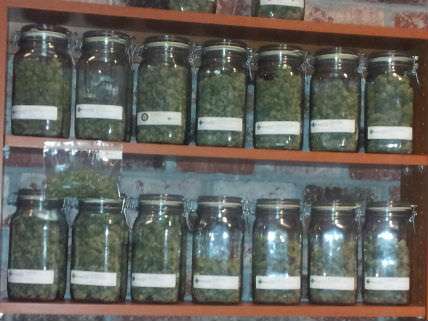Taxing Phantom Marijuana Transactions in Colorado

On Wednesday I suggested a few reasons why tax revenue from the first month of sales by Colorado's newly legal marijuana stores was not as robust as anti-pot activists feared/hoped. Tax attorney Pat Oglesby notes another reason: The stores, all of which began as dispensaries, were allowed a onetime transfer of marijuana from their medical inventories. In fact, all of the marijuana initially available for sale to recreational consumers came from medical stocks, since cultivation for general use was not allowed until January 1. That marijuana was not subject to the state's 15 percent excise tax, which applies at the wholesale level. Oglesby calculates that January's revenue was $800,000 lower than it would have been if those transfers had been taxed.
Another kind of in-house transfer complicates collection of the excise tax. Until October, marijuana stores are required to grow 70 percent of their inventory, just as dispensaries were required to do (for reasons that never made much sense). Amendment 64—Colorado's legalization measure, which is now part of the state constitution—authorizes "an excise tax to be levied upon wholesale sales of marijuana." But when the retailers are the growers, Oglesby observes, "There is no wholesale sale, so somebody has to make up a 'transfer' price to tax. That's crazy." Since there is no real transaction, marijuana suppliers have an obvious incentive to lowball the "price" they charge themselves. The Colorado Department of Revenue's solution is to collect 15 percent of the "average market rate," which it calculates based on figures reported by dispensaries for "both arms?length transactions and integrated sales."
The initial rate, based on survey data from late last year, is $1,876 per pound (about $117 an ounce) for flowers. That comes out to less than $15 per eighth. By comparison, dispensaries before legalization typically were charging about $25 an eighth, which is what Medicine Man in Denver still charges patients for many strains. Recreational customers, facing a supply that will be artificially constrained until marijuana from plants grown for the recreational market is available, pay nearly twice as much. Eventually those prices should converge, although patients will still pay less because of tax exemptions. Assuming the retail price settles around $25 per eighth before taxes, the implied retail markup is about 40 percent, which seems a bit high compared to cigarettes and beer but is in the same neighborhood as wine and liquor.
The difficulty of taxing transactions that are mostly fictitious was one of the arguments for imposing a special sales tax on marijuana, which was approved by voters in November and is currently set at 10 percent. When the vertical integration mandate expires, there should be more "arm's length transactions," which will make the excise tax easier to assess.
Editor's Note: As of February 29, 2024, commenting privileges on reason.com posts are limited to Reason Plus subscribers. Past commenters are grandfathered in for a temporary period. Subscribe here to preserve your ability to comment. Your Reason Plus subscription also gives you an ad-free version of reason.com, along with full access to the digital edition and archives of Reason magazine. We request that comments be civil and on-topic. We do not moderate or assume any responsibility for comments, which are owned by the readers who post them. Comments do not represent the views of reason.com or Reason Foundation. We reserve the right to delete any comment and ban commenters for any reason at any time. Comments may only be edited within 5 minutes of posting. Report abuses.
Please to post comments


Taxing Phantom Marijuana Transactions in Colorado
Who knows what evil lurks in the heart of men?
Is Phantom Marijuana like Toledo Window Box or something?
It's all about government revenue with you, reason, isn't it?
Mind you, selling yourself your own product at inflated wholesale prices to reduce your paper income and avoid taxes will land you on the IRS's shit list. It's quite a balancing act trying to properly kick up at every stage of the supply chain.
Selling a plant which is a Schedule I substance under Federal Law will probably land you on the Fed's shit list before your business taxes.
Nonononono. The feds are willing to turn a blind eye to all sorts of shit, smuggling, extortion, torture and murder - 'well, we have bigger fish to fry'.
Not paying your taxes well - that's a paddlin'.
So the Colorado government has this new product to regulate, so they seem intent on burdening the transactions with even more bureaucracy than all the other goods they've been regulating since 1876.
Freedom is very complicated.
If you could fill out these freedom forms in triplicate, then stand over there and the nurse will call you for your tests. Within 8 to 12 weeks of your freedom visit, you will receive a packet in the mail, fill out the pink form in #2 pencil, the goldenrod in black ink only...
I expect most consumers in CO and WA to do what I would -- grow their own. No high taxes that way, and the new law still protects you.
Incorrect.
Q: Can I grow my own marijuana now? Can I sell my homegrown marijuana?
A: Home grown marijuana for recreational use, as well as sale, is illegal. Recreational use marijuana must be purchased from a state-licensed retailer.
http://lcb.wa.gov/marijuana/faqs_i-502
Which simply means people will grown their own.
very good article Fotograf Nunta